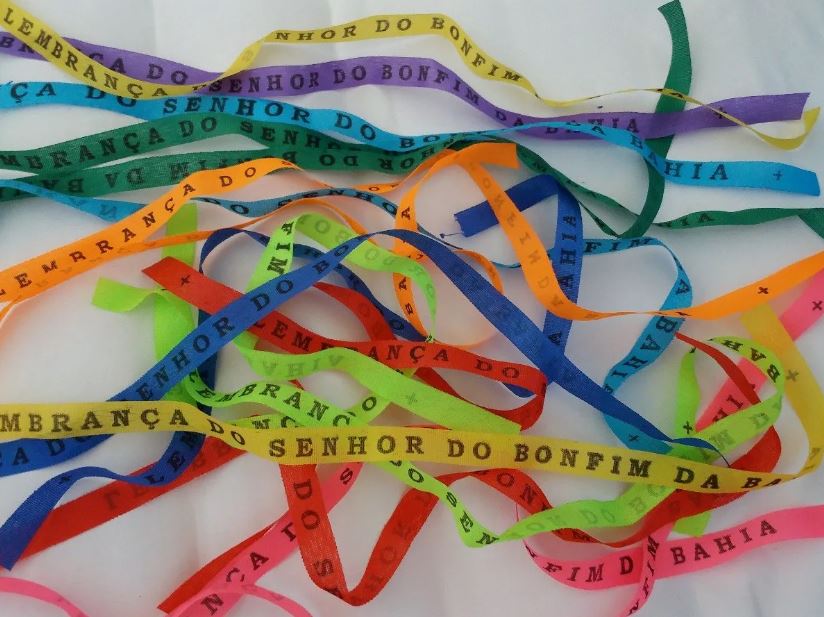
Fitas Nosso Senhor do Bonfim Bonfin Lord Ribbons Bahia Salvador Brazil
The Senhor do Bonfim Ribbon or Bonfim Ribbon is a souvenir and amulet typical of Salvador, capital of the Brazilian state of Bahia.
History: The original ribbon was created in 1809, having disappeared by the beginning of the 1950′s. Known as the ‘medida do Bonfom’ (measure of Bonfim), its name is owed to the fact that the exact measurements of 47 cm long, the length of the right arm of the statue of Jesus Christ, ‘Senhor do Bonfim’, situated on the high-altar of Bahia’s most famous church. The image was sculpted in Setúbal, in Portugal in the 23rd century. The ‘medida’ was made of silk, with the design and the name of the embroidered saint and complimented with golden or silver tint. It was worn around the neck like a necklace, where saints and medallions were hung, working as a type of currency: upon making good on a promise, the faithful carried a photo or a small sculpture of beeswax representing the part of the body which was cured with the help of the saint. As a souvenir, these ribbons would be acquired, symbolizing the church itself. No one knows when the transition occurred from the old style ribbon to the new one (worn around the wrist), although the new ribbon was popularized by the street vendors of Salvador around the 1960′s, when it was also adopted by the Bahian hippies as part of their style of dressing. Colors Sold in diverse colors, the Fita do Senhor do Bonfim possesses a side that few actually know: each color symbolizes an Orixá (or deity of the Yoruba religion). Dark green is for the deity Oxossi, light blue for Iemanjá, yellow for Oxum…Whichever the color, the ribbon holds a symbolic, aesthetic and spiritual representation typical of the Afro-Brazilian culture. Practically speaking, the colors represent various positive words (such as blue for prosperity). Usage: The famous fitas have been used by Brazilian designers locally and nationally in many different ways. To see an example, check out this page from Namira. Aside from their fashion statement, the user must have three knots tied and if the ribbon falls off naturally, the wishes will be granted. According to Travelvice.com… “Multiple chances for a miracle, or chances for multiple miracles, are obtained as the wearer makes a wish each time one of three knots are tied to secure the fita around the wrist. No wish will be granted unless the cloth is permitted to wear until it disintegrates naturally, and falls from the wrist of its accord. If you remove or cut the ribbon yourself the wishes will not—never?—come true and invites bad luck and misfortune upon you. If you plan to stay the course and leave the ribbon on, it’s a serious commitment. The typical fita is rumored to fall off after a handful of months, but I’ve read stories of ribbons staying intact for anywhere from six months to two years after they were tied! There was one Internet source found that said you must never purchase your own ribbons, but only accept them as gifts. Additionally, some sites mention a third party should tie the knots for you, as you make your wishes.”
Lot of 100, 200, 500 and 1000 pieces/ribbons


